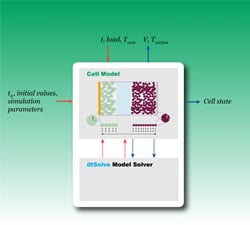 Sendyne Corp., a developer of sensing, modeling/simulation, and control products, announces the immediate availability of CellMod, the first lithium-ion battery simulation tool that can predict cell and pack behavior with an accuracy of better than 5 percent under a wide range of test conditions. The software includes Sendyne’s Pseudo-2D compact physics-based Li-ion battery cell model coupled with Sendyne’s proprietary dtSolve™, a tool that executes several orders of magnitude faster than other commercially available numerical solvers. The software may be used as a standalone tool or can be integrated with other simulation packages for whole system co-simulation via the Functional Mockup Interface (FMI), an open standard supported by all major simulation platforms.
Sendyne Corp., a developer of sensing, modeling/simulation, and control products, announces the immediate availability of CellMod, the first lithium-ion battery simulation tool that can predict cell and pack behavior with an accuracy of better than 5 percent under a wide range of test conditions. The software includes Sendyne’s Pseudo-2D compact physics-based Li-ion battery cell model coupled with Sendyne’s proprietary dtSolve™, a tool that executes several orders of magnitude faster than other commercially available numerical solvers. The software may be used as a standalone tool or can be integrated with other simulation packages for whole system co-simulation via the Functional Mockup Interface (FMI), an open standard supported by all major simulation platforms.
CellMod can be quickly adapted to represent any type of Li-ion cells, such as nickel manganese cobalt, iron phosphate, and manganese spinel devices, and all iterations of these cells. To achieve this, only a simple (non-proprietary) set of experimental data on the cell to be modeled is needed. Sendyne’s tool kit, which includes state of the art parameter extraction, then creates a unique CellMod version for a specific cell. All unique CellMod versions are created under NDA.
Currently deployed by a Tier-1 U.S. battery maker, CellMod’s uses include battery cell rapid prototyping. This reduces design time and costs, as each cell design can first be tested using the model. Design makers can utilize the model to select cells and vendors based on how well candidate cells perform in particular applications.
The compact nature of the CellMod-dtSolve™ bundle allows it to be embedded on a microcontroller within a Battery Management System (BMS) for real time predictive control. For large-scale battery systems, such as those used by electric vehicles and energy storage systems, multiple instances of the model, equal to the number of cells in the pack, can run simultaneously in real time. Little computing power or memory is required. By replacing the typical empirical models/Kalman filters with a highly accurate model enabling true predicative control, pack safety can be greatly improved and costs due to over-design can be eliminated.
By considering physical processes occurring inside the cells, such as diffusion in solids or electrolytic solution and reaction kinetics, charge transport and heat transport, CellMod can predict future battery cell behavior with a high degree of accuracy.
